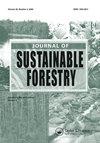Non-state Actors in Forest Governance: Genesis, Status, Challenges and Way Forward
IF 1.8
4区 农林科学
Q3 FORESTRY
引用次数: 1
Abstract
ABSTRACT Non-state actors (NSA) have become increasingly important in forest management and governance but with strikingly limited research on this subject. Here, we critically review the historical evolution and roles of major NSA in forest governance in selected tropical countries identifying the major challenges regarding sustainable and effective engagement of NSA and suggest pathways for better utilization of NSA. Historical evolution of forest governance revealed that the nature and role of NSA have substantially changed over time and NSA has expanded and diversified since the late 1970s with the introduction of different forms of community-based forest management (CBFM) models. Nevertheless, due to challenges such as predominant revenue orientation of forest governance that overshadows effective participation of NSA in governance, tenurial uncertainty, dependence on external funds and facilitation, ad hoc and project-based nature of operation, and sustainability of the relevant institutions, the outcomes of CBFM were limited. We conclude our synthesis calling for stronger policy, financial, and procedural support that ensures effective collaborations and partnerships with NSA that can result in positive outcomes for forest conservation and improvement of forest dependent local peoples’ livelihoods.森林治理中的非国家行为体:起源、现状、挑战和前进方向
非国家行为者在森林管理和治理中变得越来越重要,但对这一主题的研究却非常有限。在这里,我们批判性地回顾了选定热带国家主要国家安全局在森林治理中的历史演变和作用,确定了国家安全局可持续有效参与方面的主要挑战,并提出了更好地利用国家安全局的途径。森林治理的历史演变表明,随着时间的推移,国家安全局的性质和作用发生了重大变化,自20世纪70年代末以来,随着不同形式的社区森林管理模式的引入,国家安全区已经扩大和多样化。尽管如此,由于森林治理的主要收入导向掩盖了国家安全局对治理的有效参与、任期的不确定性、对外部资金和便利的依赖、特设和基于项目的运作性质以及相关机构的可持续性等挑战,CBFM的成果有限。最后,我们呼吁加强政策、财政和程序支持,确保与国家安全局的有效合作和伙伴关系,为森林保护和改善依赖森林的当地人民的生计带来积极成果。
本文章由计算机程序翻译,如有差异,请以英文原文为准。
求助全文
约1分钟内获得全文
求助全文
来源期刊

Journal of Sustainable Forestry
Social Sciences-Geography, Planning and Development
CiteScore
3.90
自引率
12.50%
发文量
42
期刊介绍:
Journal of Sustainable Forestry publishes peer-reviewed, original research on forest science. While the emphasis is on sustainable use of forest products and services, the journal covers a wide range of topics from the underlying biology and ecology of forests to the social, economic and policy aspects of forestry. Short communications and review papers that provide a clear theoretical, conceptual or methodological contribution to the existing literature are also included in the journal.
Common topics covered in the Journal of Sustainable Forestry include:
• Ecology, management, recreation, restoration and silvicultural systems of all forest types, including urban forests
• All aspects of forest biology, including ecophysiology, entomology, pathology, genetics, tree breeding, and biotechnology
• Wood properties, forest biomass, bioenergy, and carbon sequestration
• Simulation modeling, inventory, quantitative methods, and remote sensing
• Environmental pollution, fire and climate change impacts, and adaptation and mitigation in forests
• Forest engineering, economics, human dimensions, natural resource policy, and planning
Journal of Sustainable Forestry provides an international forum for dialogue between research scientists, forest managers, economists and policy and decision makers who share the common vision of the sustainable use of natural resources.
 求助内容:
求助内容: 应助结果提醒方式:
应助结果提醒方式:


